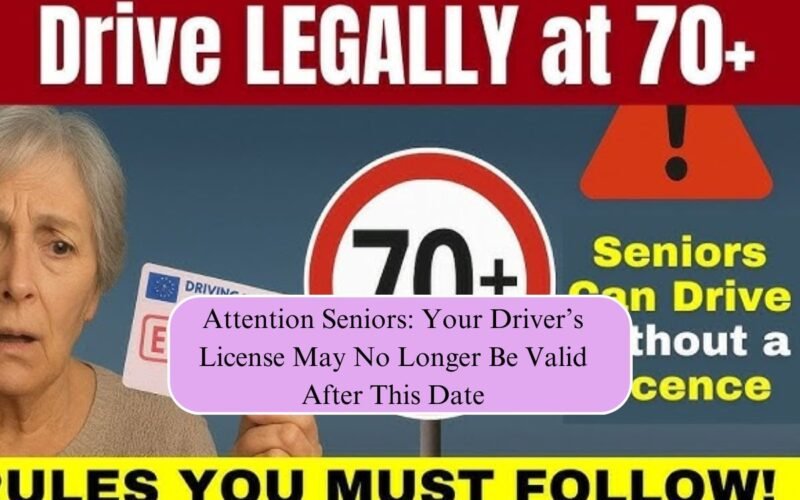Millions of seniors across the United States may soon find their driver’s licenses invalid or expired sooner than expected, as several states implement new renewal deadlines and stricter age-based requirements. The Department of Motor Vehicles (DMV) in multiple states has quietly updated its policies for older drivers, and many seniors are being caught off guard. If you are over the age of 60, it’s crucial to understand how these changes could affect your driving status — and what steps you must take before it’s too late.
Why Senior Drivers Are Facing New License Rules
With the growing number of Americans aged 60 and older maintaining active driver’s licenses, states are tightening regulations to enhance road safety. Aging can affect reflexes, eyesight, and reaction times, and DMVs are adjusting renewal processes to reflect these realities. These updates don’t mean seniors are being forced off the road — rather, they aim to ensure all drivers meet safe operating standards.
Safety experts point out that senior drivers are among the most responsible groups on the road, but periodic testing and shorter renewal intervals help detect health-related changes early. In 2025, several states will start enforcing updated renewal requirements that could lead to automatic license expiration for those who fail to comply on time.
What’s Changing — And When
While exact rules vary by state, the following changes are becoming increasingly common across the country:
- Shorter License Validity: Instead of lasting 6–8 years, senior licenses may now be valid for only 2–4 years.
- Mandatory In-Person Renewal: Many states are removing online and mail-in renewal options for drivers aged 65 and older.
- Vision and Hearing Tests: In-person screenings are now required at every renewal for seniors in several states.
- Medical or Cognitive Evaluations: Some DMVs are requiring a doctor’s clearance for individuals with conditions affecting driving ability.
- Stricter Deadlines: Seniors who miss renewal dates may face immediate license suspension without grace periods.
States such as California, Illinois, Florida, and Texas are leading these policy updates. California now mandates in-person renewals and vision tests for drivers over 70. Illinois requires a road test for anyone 75 and older, and Florida has introduced additional screenings for those above 80. Other states are expected to adopt similar changes through 2025 and 2026.
What This Means for Seniors
If your driver’s license is nearing renewal, check the expiration date immediately. Under the new rules, missing your renewal window could mean your license becomes invalid automatically, even if you’ve been driving safely for decades. Driving with an expired or invalid license could result in fines, insurance complications, or even legal penalties.
For seniors who rely on driving for independence, healthcare visits, or social activities, it’s essential to act early. Schedule appointments well before your license expires and review your state’s updated DMV requirements.
How to Prepare for Renewal
- Check Your State’s DMV Policy: Each state sets its own rules for senior drivers. Look for age-based testing or documentation requirements.
- Schedule Vision and Health Exams: Get an updated eye and medical report ready before your renewal date.
- Bring Required Documents: Proof of identity, residency, and any necessary medical certificates are typically required.
- Plan for a Road Test (if required): If your state mandates a test for older drivers, practice defensive driving skills beforehand.
- Renew Early: Avoid last-minute renewals — DMV delays could lead to your license temporarily becoming invalid.
The Bottom Line
These new rules aren’t designed to punish senior drivers — they’re about keeping everyone safe. However, missing renewal deadlines or failing to complete required screenings could result in losing driving privileges. By staying informed and renewing on time, seniors can ensure they remain confident, legal, and safe on the road.
FAQs
1. Who is affected by the new driving license rules?
Drivers aged 60 and above in several U.S. states are affected by new DMV renewal requirements and shorter license validity periods.
2. Can seniors still renew their license online?
In most states, no. Seniors typically must renew in person after reaching age 65 to complete mandatory tests.
3. What happens if my license expires under the new rules?
If your license expires and isn’t renewed on time, it may become immediately invalid, meaning you can’t legally drive until it’s renewed.
4. Are all states enforcing these new senior driver rules?
Not yet. Some states like California, Illinois, and Florida have already implemented them, while others are expected to follow in 2025.
5. What kind of tests will seniors need to take?
Vision screenings, possible cognitive evaluations, and — in some cases — short road tests to assess driving ability.

